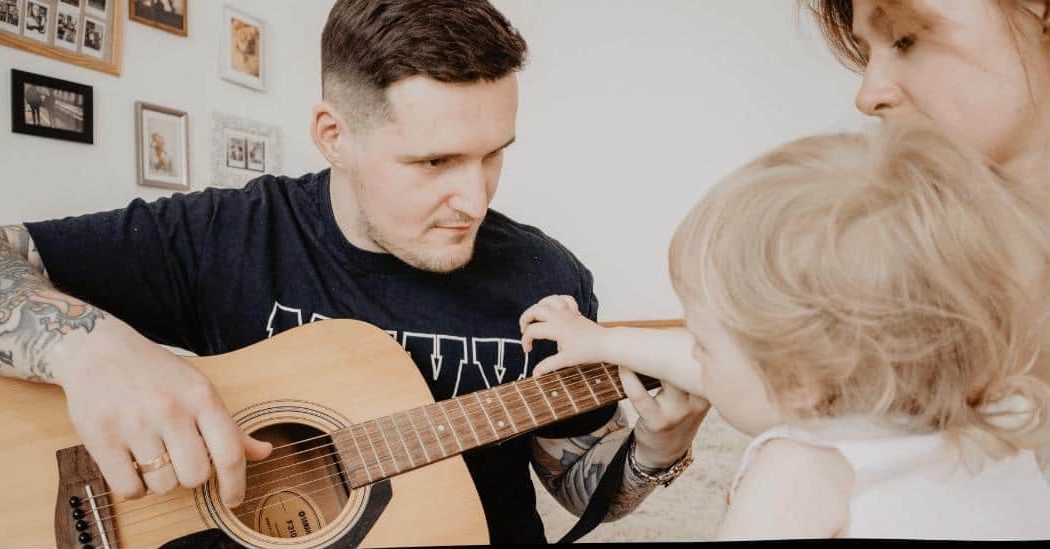Several recent articles in scientific journals point to the wide range of significant effects that learning and listening to music has on the brain development of children and adolescents. Other studies reveal that when parents share musical experiences with children and teens, including listening and/or dancing to music, as well as singing songs together, it has a positive effect on parent-child relationships.
Music’s Effects on Brain Development
Based on the use of various neuroimaging techniques, research shows how early music training (before the age of seven) produces actual physical changes in brain structure and function.
One study found an increase in the white matter in the corpus callosum (the switchboard in the center of the brain) which results in increased brain connectivity. Einstein learned to play the violin as a young child, and a study of his brain showed unusually strong connections.
Another recent study determined that early musical training increased the grey matter in the cerebral cortex, particularly in the sensory-motor area of the brain. The improved coordination this produces was also found to improve emotional regulation and the ability to inhibit responses to events. This, of course, enhances a child’s ability to handle frustration and avoid over-reacting to difficult situations.
Yet another finding from neuroimaging was that even brief musical training results in an increase in blood flow in the left side of the brain. This is thought to result in improved language processing ability.
In March 2018 at the National Institutes of Health Kennedy Center Workshop on Music and the Brain, a panel of scientists highlighted research findings showing that from infancy, children are responsive to listening to music, and the experience significantly contributes to language development. The group also noted that in addition to promoting language development, music has a positive effect on the development of other cognitive functions including attention, visual-spatial perception, and executive function.
Due to an increased interest in the relationship between music and brain function, a new field of study known as neuromusicology was created. Using brain imaging techniques in research conducted over the past few years resulted in the conclusion that music activates every known part of the brain. This applies to all of us when we listen to music. For musicians, the act of playing an instrument not only activates the brain but also influences brain development. In general, the brains of musicians are larger, and more extensively connected than those of the general population. They also have a superior working memory, auditory skills, and cognitive flexibility. All of these brain functions are enhanced due to neuroplasticity. This phenomenon, simply stated, is that active and passive activity over time “rewires” the brain by either forming and/or strengthening existing circuits or forming new neurons.
Music’s Effects on Academic Success
At the World Conference on Learning, Teaching and Educational Leadership held in 2012, research studies from multiple sources were shared. For a while now, music has been thought to provide an effective experience in schools for children to develop listening skills as well as for children with learning difficulties. A child’s active engagement in music can have many positive effects, including:
- Perceptual, language and literacy skills
- Numeracy
- Intellectual development
- Attention and concentration
- Physical development and health
Music’s Impact on Social and Emotional Development
Playing an instrument can lead to a sense of achievement as well as an increase in self-esteem. Further advantages can include increased confidence, persistence in overcoming frustrations when learning is difficult, and self-discipline. Working with the Miami Music Project, the Florida International University’s Community Based Research Institute conducted a study which looked at how school group music programs affected the “5 C’s” of social development: competence, confidence, caring, character and connection. The study followed 180 children, ages 8 to 17 years-old for a period of three years. These kids were participating in an orchestra model of music instruction. The results presented in February 2019 found that these students showed significant increases in all of the “5 C’s.”
Starting Music Lessons at an Early Age Reaps Big Benefits
Listening to music at any age is beneficial, as is learning to play a musical instrument (even as an adult), which can result in personal satisfaction and positive changes in brain functioning. However, the current consensus of the experts is that maximum benefits are attained when musical training begins before the age of seven. Parents are becoming more in tune with providing exposure to music early on. Earphones for the belly are now available so moms can let their baby start listening to music before they are born. Singing to your baby and providing access to simple toys that make musical sounds are a good start. Providing toddlers with musical toys and playing along with them exposes children to the cause and effect of making sounds and they can learn to play simple toons.
Sharing Musical Moments with Your Kids Will Improve Your Relationship
A research article published in the Journal of Family Communication in 2018 found that parent-child musical engagement with children and teens improved the relationship between parents and their children, particularly in the area of empathy and social interactions. Participating in music such as dancing or singing together requires synchronization.
Even simply listening to music activates areas of the brain associated with empathy, positive feelings, and pleasure. Neuroscientific research has found that listening to music results in the release of dopamine, the neurotransmitter that activates the pleasure center of the brain.
You could say that participating in a musical activity together makes the participants more in tune with one another. This synchronization goes beyond the musical experiences to everyday life. Other research indicates that the development of empathy during childhood leads to prosocial behavior including cooperation and improved social interactions.
There are many ways parents and children can interact musically.
Singing often starts with parents singing a lullaby to their baby. Parents are encouraged to sing often to their babies and young children. Singing to infants and toddlers not only instills bonding, but it’s also vital to language development. With older children, you can sing along with them. Singing together gets you in sync with each other. Find fun songs you can learn to sing together one on one and with the whole family. Singing is a great activity for road trips, campfires and family nights.
Listening to Music Together is great fun as well. Find your favorite tunes and enjoy. Try new music. Introduce your kids to listening to classical music at home. YouTube has some fantastic videos to introduce kids of all ages to classical music.
Going to a Concert Together is a wonderful way to spend some special time with your kids. If your community has a symphony orchestra nearby, many of them provide special programs for kids to introduce them to the classics. These programs are fun and usually are meant for kids and parents to attend together. Look for concerts for other types of music such as pop and country to attend with older children and teens.
Learning to Play an Instrument Together is an activity to consider for you and your child. Your participation would be a motivator for your child, and research shows that evolvement in music benefits cognitive functioning and social/emotional skills for adults as well. This could become a shared hobby/interest, and you could play duets together.
Singing in a Choir Together can be another way to share an activity with your teen. If you both like to sing, you should consider joining a church or community choir.
Music has proven to be positive for development and as a joint activity. Connectedness creates a sense of belonging as well as feeling safe and secure. The basics include engaging in fun and meaningful activities, creating moments of close personal one-on-one time, developing family traditions, and providing personal space when needed. Sharing musical experiences with children fits in with two key ways to improve connectedness—play and family activities.
(Courtesy Child Development Institute)





Leave Your Reply